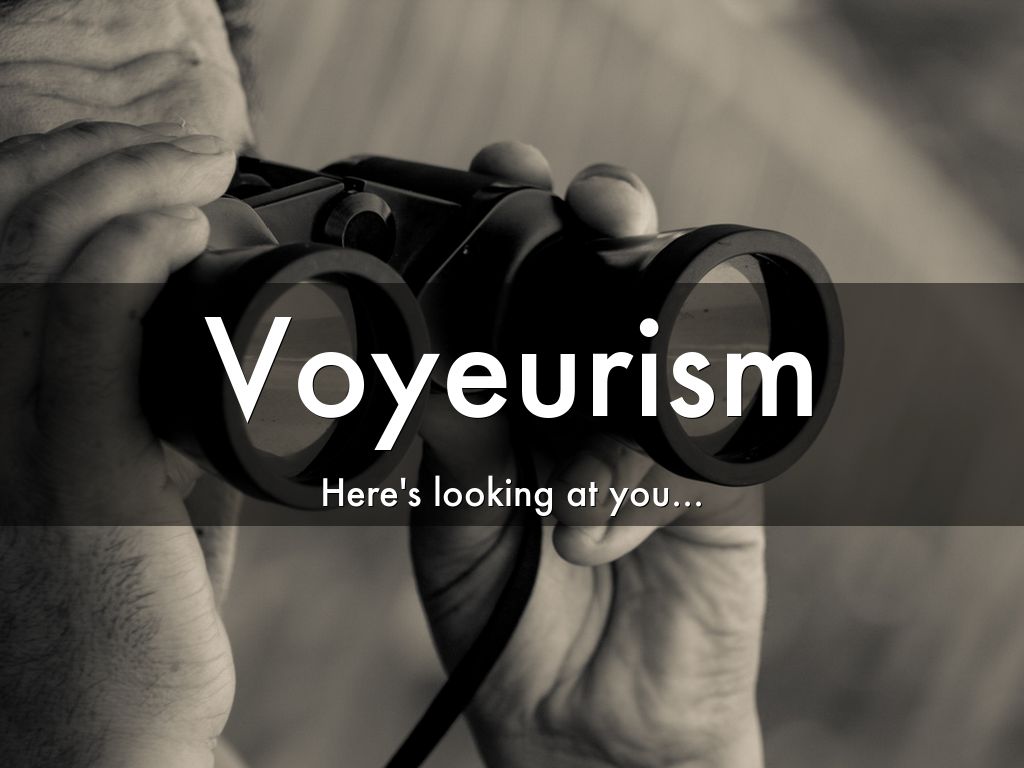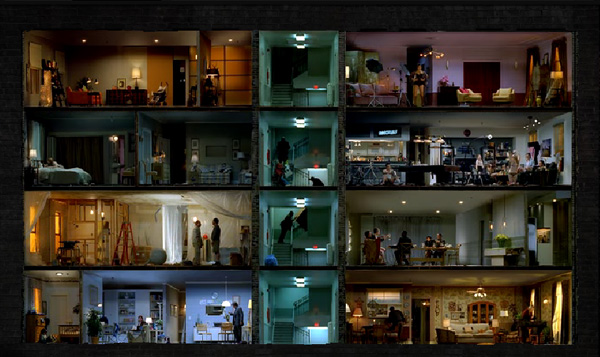Where Voyeurism and Reality TV Meet
Where Voyeurism and Reality TV Meet
Almost two decades have passed since the reality television programs have captured our television screens, in almost every country on earth. We've been warned for a long time that the genre is losing its power, and yet, again and again, new programs are coming up on our TV screens.

Image Credit
The feeling is that thousands of discussions have been devoted to the subject, but in fact, one of the central and accepted explanations for the secret of the reality programs - the voyeurism factor - is emerging.
The more you think about it in depth, the more it seems that this is a partial and insufficient explanation, especially one that misses the opportunity to understand something deeper about the human nature.
Does someone who observes religiously in a documentary series fail to satisfy his voyeurism?
Is the idea of voyeurism is a precise and significant explanation enough for the addition of hundreds of millions of viewers precisely to this genre that so overwhelmingly conquered the entire world?

Image Credit
There is no doubt that the reality programs have set a new standard for the way in which the participants agree to the almost total control of the production team over their lives. The participants selected for the program become an object of observation for millions of invisible eyes. Voyeurism is a situation in which the person who looks at it does not know about it, or at least is in a state of lack of control over how it appears to others.
Voyeurism
A voyeur, by definition, is someone who comes to sexual gratification by looking at the nudity or sexual acts of others, especially from a secret or hidden point of view.Voyeurism is a psychological disorder and constitutes a subgroup of paraphilic disorders. There are many types of voyeurism, including listening to erotic conversations. The goal of voyeurism is to look at innocent people who are naked, in the process of expanding or engaging in sexual activity.
The observed person is usually a stranger to the viewer, and only the peephole is made for sexual arousal, but without sexual activity. Although the voyeur may often engage in fantasy about the observed person, he will rarely direct himself to this action.
A certain degree voyeurism is common. Different types of sexual presentation are a normal part of sexual attraction and courtship behavior among most animals, including humans. But voyeurism is considered to be perverse behavior when observation ceases to be one cause of sexual attraction and becomes the sole or primary source of gratification.
The risk that the voyeur will be caught is another element of excitement and the rise of hormones, so this behavior may be chosen to increase the sexual pleasure.
In some countries, voyeurism is considered criminal and criminal behavior, but in most countries, it is forbidden for anyone to photograph another person, without his consent, while looking into the privacy of his home or other private frameworks.

Image Credit
Most of us take for granted the fact that we are photographed and documented all the time during the day. Your child's babysitter also participated in a reality show without her knowledge, when a hidden camera captures everything that happens in our home. Today, parents hide hidden cameras in every corner of the house.
One way or another, the use of surveillance techniques of this kind has increased in our world to the point where voyeurism is no longer perceived as controversial. Many people today seem to prefer to live their lives when viewed by others, a fact that reinforces their sense of self-fulfillment. Voyeurism is defined in the broad context as a glimpse of others for purposes of pleasure without sexual connotation. Studies have shown that the reason for viewing is not the hope for sexual satisfaction, and viewers in the vast majority of countries also know that censorship will prevent them from any such status.
Reality programs in countries know viewers will never be exposed to scenes of this kind. There seems to be no dispute with Nobby and her colleagues that there is a difference between the instinct of sexual voyeurism and curiosity to follow a dynamic between people under stress.
The Founding Fathers Of The Genre
Two people are responsible for a dramatic turnaround plan made toward reality television: John de Mol Jr, a Dutch media tycoon is one of the men behind production companies of the formats whose company signed on is "The Big Brother" originally broadcast in the Netherlands and subsequently syndicated internationally.The second is James Mark Burnett, is a British television producer and director known, acted as executive producer for "Survivor", the plan has been produced to date have been broadcast in more than 70 countries.
There is a story that John de Mol got up in the night sweating and felt as though the one-time idea. The program called "The Golden Cage" - the idea was to close people for a year, they will learn to grow their own food and take care of all their needs. "The Big Brother" allowed the addicted viewers to follow for 24 hours a day after the contestants. John De Mol said in an interview with Newsweek: "No one knows what is real and what is real and what is fictional," and hinted at where the program was directed.
Mark Burnett, for his part, first heard about a new idea for a show by a prolific British producer named Charlie Parson. The format spoke of a group of starving people stranded on a deserted island, while the hostess who lived on an exclusive yacht washes them one by one.

Image Credit
The idea came to Brent's mind. For months on his business trips, he would look around and try to imagine how each would behave if the plane crashed on a deserted island. Brent felt he could do something really big with this idea and acquired the rights. Although "The Big Brother" is run in an air-conditioned villa and "survival" on an exotic island, the principle is the same: a group of people locked or isolated. In a gradual deposition process, the contestants drop out until the last one survives. The open-air missions of the jungle were replaced by salon tasks. Brent and de Moul believed ordinary people who, under unusual stress conditions, would exhibit extraordinary abilities and behaviors.
"The intriguing fact is that you can not expect how people will behave in the society of people they do not know and in a cruel and unfamiliar environment," Burnett said.
The half-naked people in Survivor walk around the island and have to fish their own meal, marking the return to a primitive place where the passions burst and the truth comes out. The villa in the "The Big Brother" house is more like the air-conditioned offices where a painted but bloody political war of survival takes place.
In both cases, the war of survival is based on a basic belief that success depends first and foremost on the political process of planning and plotting. What is the not too distant past was expressed in whispers about connections and personal preferences is today perceived as the driving force of the world.
Brent does not believe that man's creation is better than his youth: people, says Brent, want to advance at any price. Like the program, even in the workplace, most people will talk about others behind their backs and will not hesitate to stab them in the back.
Brent and de Mol belong to the great group of coaches in modern history. Already during the first season, experts began to encourage viewers to learn from "survival" how to behave in the workplace.
The choice of members of the Labor Party began to be perceived as an alliance, out of the perception that a person who fails to form a strong inter-ministerial union will fail at work, even if he is the most talented in society.
Robert Greene is an American author known for his book "The Power," recommends how to spy on and talk to the junior people at the office, and start drinking in the boss's regular coffee shop. "Here you always drink."
It is no longer possible to blame people who nurtured paranoid feelings toward others. On the other hand, there is a clear message that "everyone can": build a restaurant, learn a business, become famous. Winning a poetry or dance competition, which is more like a seemingly net talent, is ultimately decided by the ability to navigate socially and politically, to be modest, to make viewers and other participants like you, and especially to prove that you are ready to undergo a process in front of everyone.
So Why Do We Benefit When Is Your Favorite Candidate Losing?
The viewer of the reality shows acquires the most valuable asset: he knows the "truth"; he is the only one aware of everything that happens in the "real" dimension of the series; He eavesdrops on the personal conversations of the contestants and is exposed to plots that try to thwart each other and ostensibly recognize the true nature of the characters.In a program that is all an expression of striving for the real, the spectator gains a grasp of the real. Even the candidate who chooses it will lose, the viewer is the real winner of the genre. Competitors who are deprived of the series sometimes begin to cry out - for most of them, living in the villa is more meaningful than being outside the villa.
The contestants talk about a powerful experience, an experience that has a greater reality than life itself. The viewer takes part in this reality until the last moment and is the only one who experiences it fully.
There are quite a few distorted variations of the genre of reality, most of them disappear after one season. The claim that the magic of the genre is to watch the humiliation of the contestants has already been examined and fortunately proven by researchers as incorrect.
A reality program based entirely on basic lies or ridicule does not allow for an illusion of truth, hence the basic promise of the genre cannot exist.
In the general atmosphere of loss of reality, we ask the reality programs to fulfill what they have promised, and in particular to give the viewer what reality itself has ceased to provide: to be within touching distance of the real, and the authentic, but in such a way that it will never threaten him Or endanger him.

Image Credit
Live Like Mannequins
Psychologists will no doubt be able to give fascinating answers to the question of what motivates people to stand up to audacious auditions to "get" locked up for long weeks in a secluded home with a bunch of strangers when all your actions are watched by hundreds of thousands of people every second for money and advertising.Second, is there a fundamental difference between a program in which people confront each other and are even willing to humiliate themselves in order to win a material prize for the popular gladiator shows popular in the Roman Empire?
We will not deny that one difference is certain. Here 'Gladiator' came to the arena of his own free will.
But the goal is clear: in so doing, he releases the viewers from the experience of guilt. On the contrary, we are good and nice to Gladiator by agreeing to watch it (reality), and therefore we can humiliate him as much as we want, especially in programs whose humiliation is their essence. In so doing, the program ostensibly allows for moral cleanliness in terms of its sacred "Live and Let Live", and at the same time to put an end to moral criticism.
But in the end, the important question that remains is not what it does to the participants, but what it does to us. What kind of person is the one who enjoys humiliation, quarrels, and quarrels? What sort of society is the one that is most funny and amusing is the suffering and humiliation of people, and it is so easy to sell a product of this kind?
The last question is not the sad story of an entire culture that gave up finding a real taste in its own life and therefore wasting its time on the obsessive voyeurism of others.





Until next time, thank you for visiting @nirgf
Feel free to leave a comment below!

What an interesting and thoughtful post thank you. Personally I really dislike 'reality tv' because it isn't reality. In fact I get annoyed with anything that purports to be 'reality tv' when it obviously isn't, such as "gogglebox" when ordinary people ham it up for the viewers. Fine if you like that sort of thing but I'd rather not. I'm afraid it's the mirror of our age.
I also do not like reality shows, I really do not like them
When I wrote this post, I tried to understand what the differences voyeurism/reality...
I think it is not age but a kind of curiosity.
Thank you so much for the response
Please reply to this comment if you accept or decline.
Accepted
Thank you very much, I am very happy that my post has been selected :)
This post is not original. Please do not submit to Muxxybot, thanks.
Sad but true.. I will admit it. I am addicted to Big Brother... only have been watching for the last few years but the year that really got me was when a local girl on the show won the grand prize 500k. I know her family.. so that season REALLY hooked me.
Yeah, this show is a guilty pleasure!
It's a different story when you know one of the participants - it is "okay" to follow
Thank you very much for your response and warm words
ישראלי?
Upvote with 73.91% by @votex
This post has received a 17.40 % upvote from @booster thanks to: @nirgf.
This post was resteemed by @steemvote and received a 41.33% Upvote
Congratulations! This post has been upvoted from the communal account, @minnowsupport, by nirgf from the Minnow Support Project. It's a witness project run by aggroed, ausbitbank, teamsteem, theprophet0, someguy123, neoxian, followbtcnews, and netuoso. The goal is to help Steemit grow by supporting Minnows. Please find us at the Peace, Abundance, and Liberty Network (PALnet) Discord Channel. It's a completely public and open space to all members of the Steemit community who voluntarily choose to be there.
If you would like to delegate to the Minnow Support Project you can do so by clicking on the following links: 50SP, 100SP, 250SP, 500SP, 1000SP, 5000SP.
Be sure to leave at least 50SP undelegated on your account.
Mice